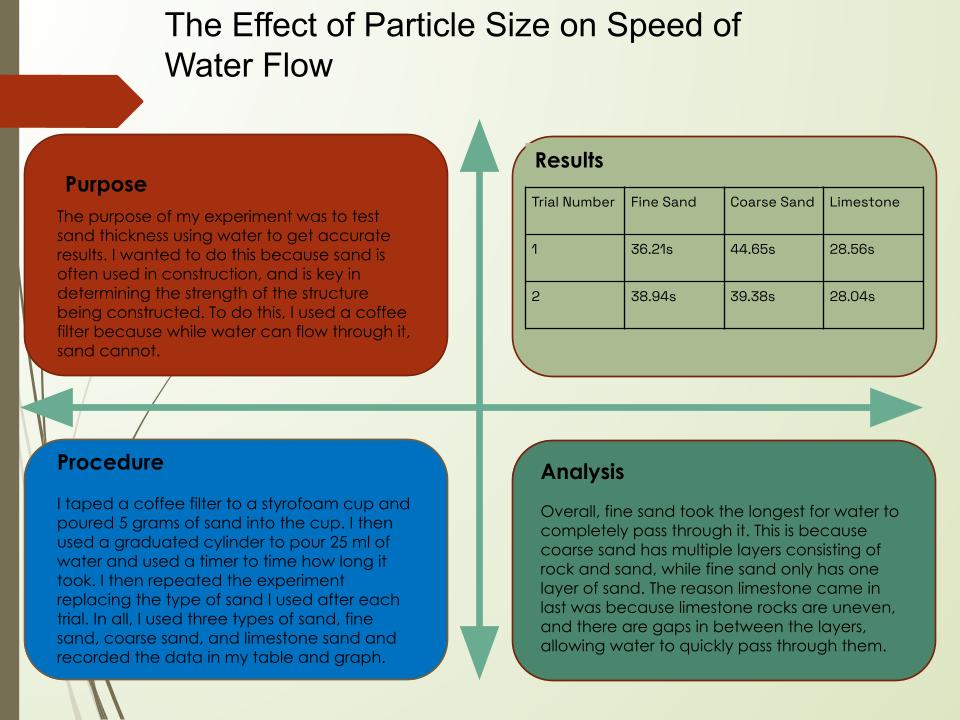Sand Science: The Effect of Particle Size on Speed of Water Flow
Abstract:
Bibliography/Citations:
No additional citationsAdditional Project Information
Project files
Research Plan:
- Gather all necessary materials to prepare for testing.
- Pour 5 grams of fine sand on top of a coffee filter, making sure not to spill any sand.
- Place the coffee filter full of sand on top of a pitcher by the sink and grab a graduated cylinder and some water.
- Measure exactly 25 ml of water
- Get a timer, pour the water into the coffee filter filled with all of the fine sand and start the timer. Stop it when the water has fully passed through all of the sand and hits the bottom of the pitchers.
- Record the data in your table/ chart
- Use the paper towel to clean both the filter and graduated cylinder used for this experiment.
- Repeat steps 2-7, replacing the fine sand with coarse sand instead.
- Repeat steps 2-7, replacing the type of sand with limestone instead of coarse sand.
- Record all data in your table and chart
Questions and Answers
1. What was the major objective of your project and what was your plan to achieve it?
a. Was that goal the result of any specific situation, experience, or problem you encountered?
b. Were you trying to solve a problem, answer a question, or test a hypothesis?
My experiment's major objective was to answer a long-running question of mine. I go to the beach quite a bit and I've always wondered how thick each grain of sand is and why. From conducting this experiment I now know that sand thickness directly relates to particle size.
2. What were the major tasks you had to perform in order to complete your project?
a. For teams, describe what each member worked on.
I worked alone on my project and was in charge of creating the setup as well as carrying out the experiment after the planning phase had concluded. I used my knowledge of the experiment to perform and modify it when problems arose, and I was also in charge of recording the results in a chart.
3. What is new or novel about your project?
a. Is there some aspect of your project's objective, or how you achieved it that you haven't done before?
b. Is your project's objective, or the way you implemented it, different from anything you have seen?
c. If you believe your work to be unique in some way, what research have you done to confirm that it is?
My project is new, in that I took several ideas from my peers and combined them to make a slight nuance in the presentation. I believe that this helped me because by taking elements from other presentations, I was able to acquire the best from each.
4. What was the most challenging part of completing your project?
a. What problems did you encounter, and how did you overcome them?
b. What did you learn from overcoming these problems?
Some problems I overcame while participating in the science fair were rebuilding my setup, and revising my procedure. To overcome these problems, I simply took a second and rethought my experiment so I wouldn't make the same mistake. I learned from these problems that my procedure was the most important part of my presentation and that I should focus the most on it.
5. If you were going to do this project again, are there any things you would do differently the next time?
If I were to redo this project I would change a couple of things I did. I would first edit my setup, as I had quite a few problems with it in which I spilled quite a few bags of sand, and even broke a pitcher. I, however, now know the importance of a good setup. One other thing I would change is my procedure as I had difficulty following it.
6. Did working on this project give you any ideas for other projects?
While working on this project didn't give me any ideas for any new projects to start, it did give me ideas on how to better perform old ones. I now feel that I am more prepared for a science fair because I know how to conduct a good experiment.
7. How did COVID-19 affect the completion of your project?
Thankfully, because I was able to perform my experiment at school, Covid didn't have any real effect on my project completion. I was able to test out my experiment in a Covid safe environment without having to adjust my project and was able to complete my project in the required amount of time.

